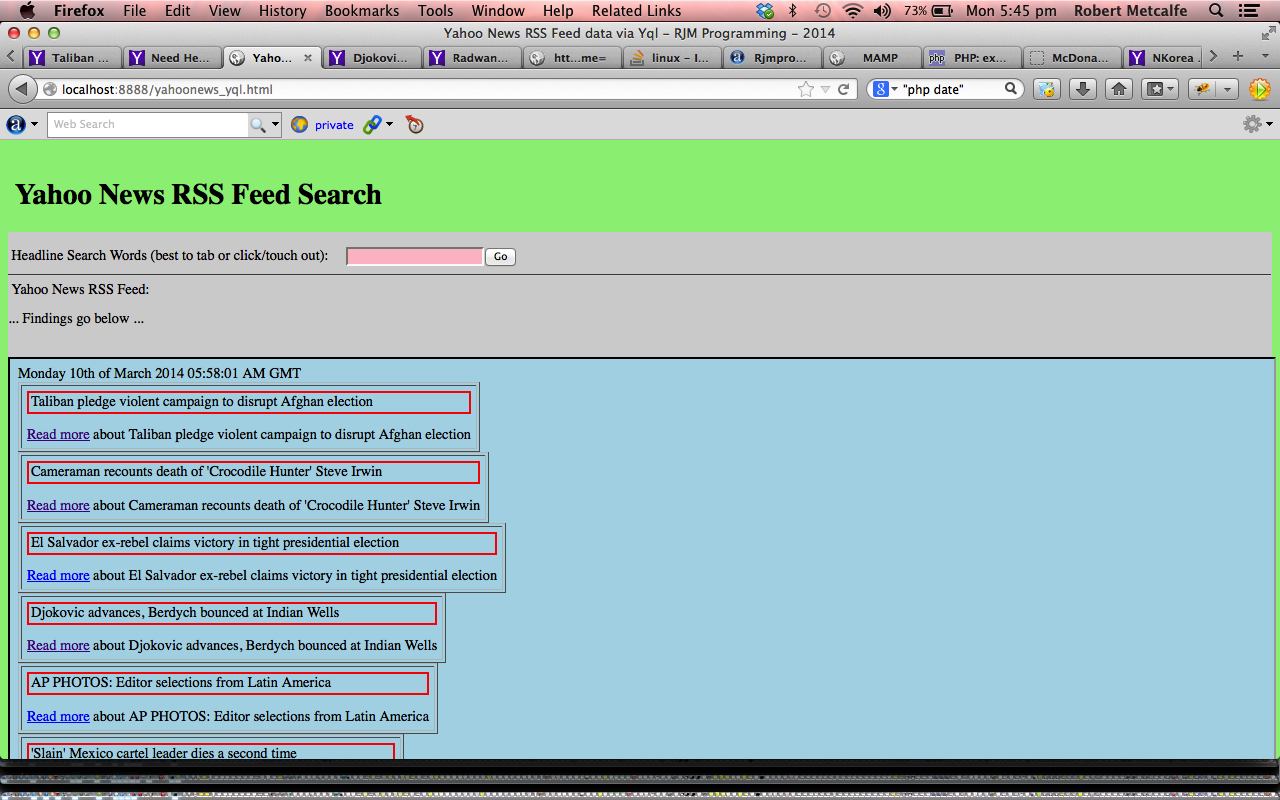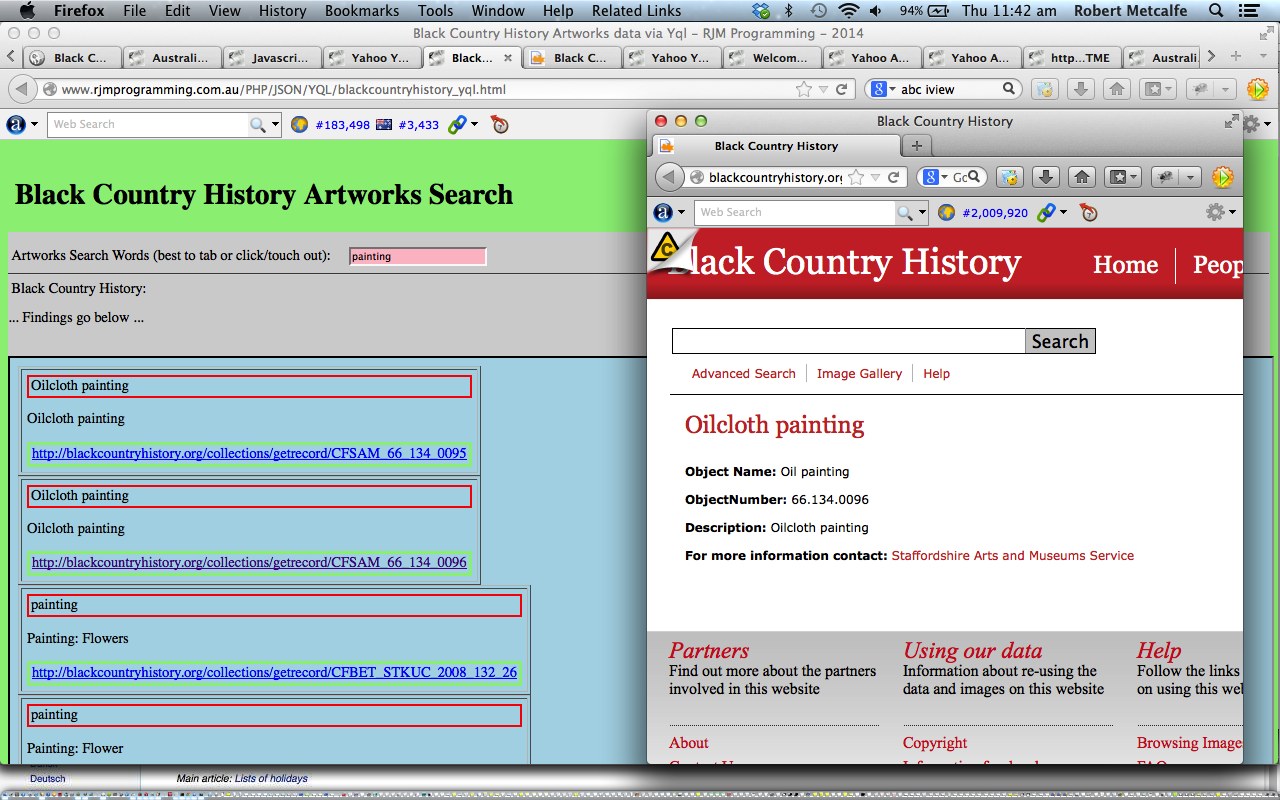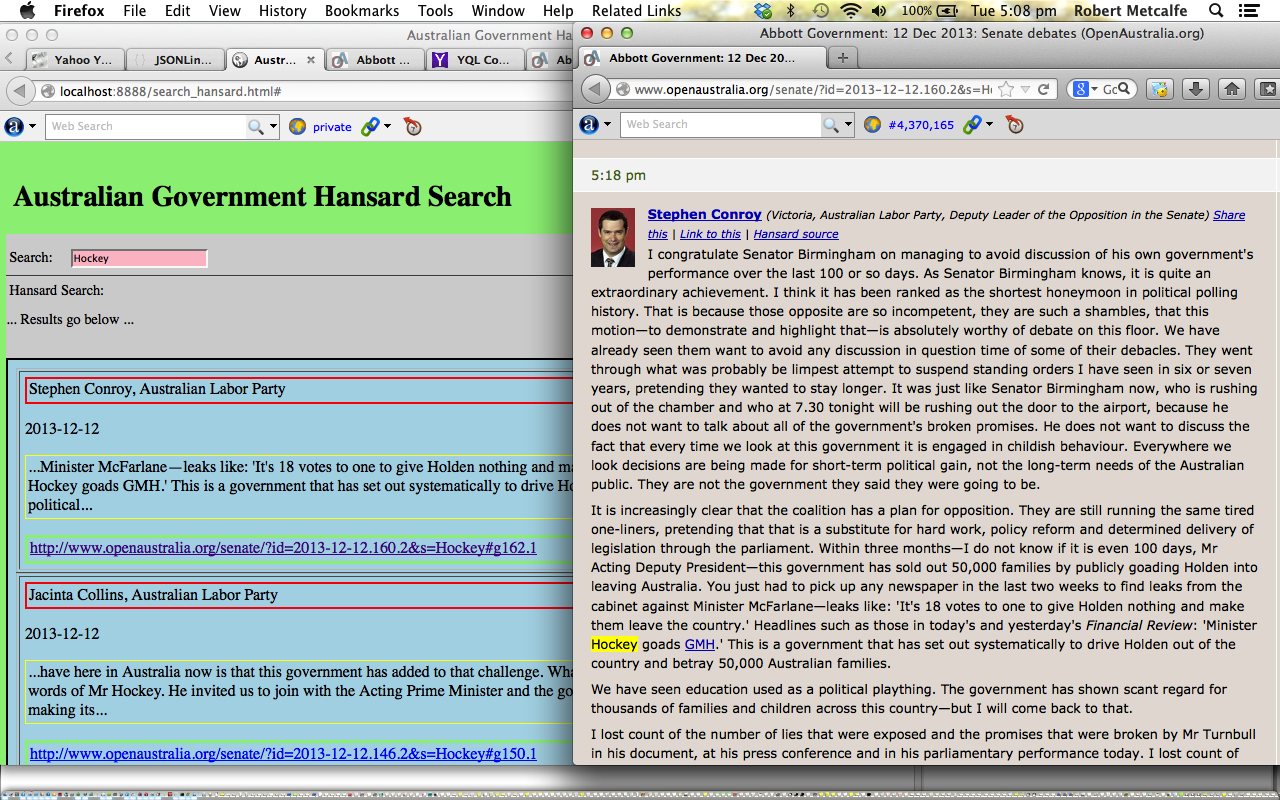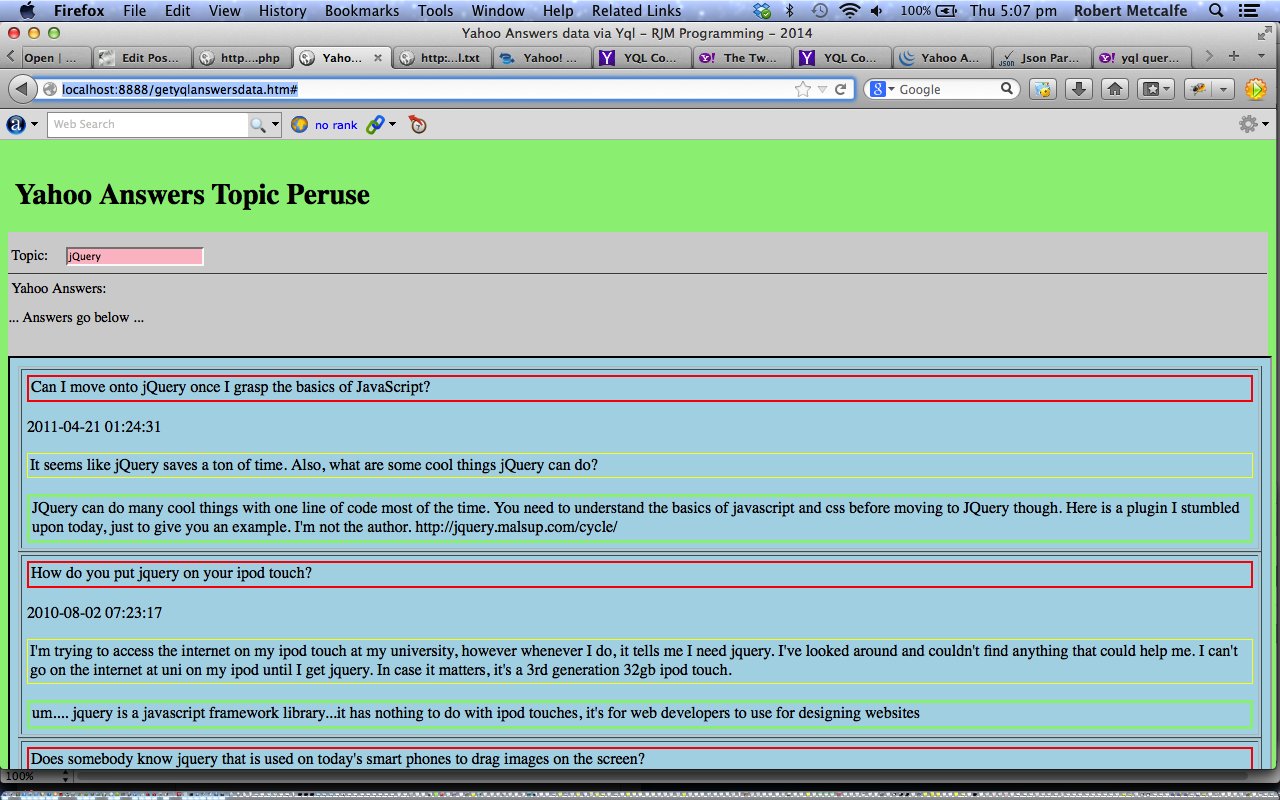Here is a tutorial that may be introducing you to the Yahoo Web Services called YQL, building on the previous previous relevant YQL Server tutorials starting with Yahoo YQL Web Service JSON Next Tutorial as shown below. Today we show that you don’t have to use JSON for this work if you don’t want to, but it is advised for data with structural complication. It is just that today’s data, the headlines of Yahoo News, has a very simple data structure. In the case of a very simple data structure you can use the PHP explode method to create a one dimensional array of headlines from the file_get_contents() YSQL url data. The explode PHP function can become a very clever and close friend, but worry about if you are all rooming together and you have a roster for the washing up … “explode” might explode your regime … chortle, chortle.
With programming, if there are several ways to solve things, and it is good to try other ways sometimes, so that you get the practice, and as a way to simplify code, sometimes. Also, the cat, though skinned horizontally, will show you that little bit of extra attention. (don’t know what got into me)
In the same mode of subject matter, it is also good to settle on good methods if they work, because, after all, what is most important is that the method works, and you try to have it work as “advertised” (sometimes this is a bit harder than you might think, with the rapidly changing software trends and arrangements with Web Services, in particular).
Have we rabbitted on enough, or would you like some facts about hare“s“? … chortle, chortle.
Here is a link to some downloadable HTML programming source code which you may want to rename to yahoonews_yql.html which calls some downloadable PHP programming source code which you may want to rename to yahoonews_yql.php
The PHP function used is:
Good links for information regarding this tutorial (thanks) are:
- YQL Two Minute Tutorial from Yahoo
- Yahoo! Query Language from Wikipedia, as per quote above
- YQL Home Page from Yahoo
- YQL Yahoo News RSS Feed help from Yahoo
Previous relevant YQL Server tutorials starting with Yahoo YQL Web Service JSON Next Tutorial are shown below.
Here is a tutorial that introduces you to the Yahoo Web Services called YQL, building on the previous Yahoo YQL Web Service JSON FollowUp Tutorial as shown below. The name is the way it is because it simplified the API aspects of its functionality for the developer to concentrate on SQL, and I’m really supportive of this concept. You don’t have to output in JSON, as other data forms like XML are acceptable. Let’s see what Wikipedia says about YQL below.
Yahoo! Query Language (YQL) is an SQL-like query language created by Yahoo! as part of their Developer Network. YQL is designed to retrieve and manipulate data from APIs through a single Web interface, thus allowing mashups that enable developers to create their own applications.[1]
Initially launched in October 2008 with access to Yahoo APIs,[2] February 2009 saw the addition of open data tables from third parties such as Google Reader, the Guardian, and The New York Times.[3] Some of these APIs still require an API key to access them. On April 29th of 2009, Yahoo introduced the capability to execute the tables of data built through YQL using JavaScript run on the company’s servers for free.[3]
So this tutorial uses a YQL web service into the data emanating from its links to the Black Country History artworks database. You fill in search words to search for artworks of interest linked to the Yahoo YQL Black Country History database tables.
The two big PHP functions of use are:
Good links for information regarding this tutorial (thanks) are:
- YQL Two Minute Tutorial from Yahoo
- Yahoo! Query Language from Wikipedia, as per quote above
- YQL Home Page from Yahoo
- YQL Black Country History help from Yahoo
- YQL JSON Parsing Help from YQL forum
Another tool you should have in your armoury for jobs like this is the online JSON validator here. A generic JSON approach to issues could be:
- Type the URL you were given into a web browser address bar and have a look at it
- Type the URL you were given into http://jsonlint.com/ and have it validated
- Understand in your own mind what would be different about 1. to make it suitable
- Incorporate findings of 3. into massaging of data between file_get_contents and json_decode
Here is a link to some downloadable HTML programming source code which you may want to rename to blackcountryhistory_yql.html which calls some downloadable PHP programming source code which you may want to rename to blackcountryhistory_yql.php
Previous Yahoo YQL Web Service JSON FollowUp Tutorial is shown below.
Here is a tutorial that introduces you to the Yahoo Web Services called YQL, building on the previous Yahoo YQL Web Service JSON Primer Tutorial as shown below. The name is the way it is because it simplified the API aspects of its functionality for the developer to concentrate on SQL, and I’m really supportive of this concept. You don’t have to output in JSON, as other data forms like XML are acceptable. Let’s see what Wikipedia says about YQL below.
Yahoo! Query Language (YQL) is an SQL-like query language created by Yahoo! as part of their Developer Network. YQL is designed to retrieve and manipulate data from APIs through a single Web interface, thus allowing mashups that enable developers to create their own applications.[1]
Initially launched in October 2008 with access to Yahoo APIs,[2] February 2009 saw the addition of open data tables from third parties such as Google Reader, the Guardian, and The New York Times.[3] Some of these APIs still require an API key to access them. On April 29th of 2009, Yahoo introduced the capability to execute the tables of data built through YQL using JavaScript run on the company’s servers for free.[3]
So this tutorial uses a YQL web service into the data emanating from its links to the Hansard database of Australian federal Government business. You fill in search words to search for in the Hansard data at the Yahoo YQL OpenAustralia database tables.
The two big PHP functions of use are:
Good links for information regarding this tutorial (thanks) are:
- YQL Two Minute Tutorial from Yahoo
- Yahoo! Query Language from Wikipedia, as per quote above
- YQL Home Page from Yahoo
- YQL OpenAustralia help from Yahoo
- YQL JSON Parsing Help from YQL forum
Another tool you should have in your armoury for jobs like this is the online JSON validator here. A generic JSON approach to issues could be:
- Type the URL you were given into a web browser address bar and have a look at it
- Type the URL you were given into http://jsonlint.com/ and have it validated
- Understand in your own mind what would be different about 1. to make it suitable
- Incorporate findings of 3. into massaging of data between file_get_contents and json_decode
Here is a link to some downloadable HTML programming source code which you may want to rename to search_hansard.html which calls some downloadable PHP programming source code which you may want to rename to search_hansard.php
Previous relevant Yahoo YQL Web Service JSON Primer Tutorial is shown below.
Here is a tutorial that introduces you to the Yahoo Web Services called YQL. The name is the way it is because it simplified the API aspects of its functionality for the developer to concentrate on SQL, and I’m really supportive of this concept. You don’t have to output in JSON, as other data forms like XML are acceptable. Let’s see what Wikipedia says about YQL below.
Yahoo! Query Language (YQL) is an SQL-like query language created by Yahoo! as part of their Developer Network. YQL is designed to retrieve and manipulate data from APIs through a single Web interface, thus allowing mashups that enable developers to create their own applications.[1]
Initially launched in October 2008 with access to Yahoo APIs,[2] February 2009 saw the addition of open data tables from third parties such as Google Reader, the Guardian, and The New York Times.[3] Some of these APIs still require an API key to access them. On April 29th of 2009, Yahoo introduced the capability to execute the tables of data built through YQL using JavaScript run on the company’s servers for free.[3]
So this tutorial uses a YQL web service into the data emanating from the brilliant Yahoo Answers website. You fill in a topic and see some Yahoo Answers questions and answers in regard to that topic.
The two big PHP functions of use are:
Good links for information regarding this tutorial (thanks) are:
- YQL Two Minute Tutorial from Yahoo
- Yahoo! Query Language from Wikipedia, as per quote above
- YQL Home Page from Yahoo
- YQL Yahoo Answers help from Yahoo
- YQL JSON Parsing Help from YQL forum
Another tool you should have in your armoury for jobs like this is the online JSON validator here. A generic JSON approach to issues could be:
- Type the URL you were given into a web browser address bar and have a look at it
- Type the URL you were given into http://jsonlint.com/ and have it validated
- Understand in your own mind what would be different about 1. to make it suitable
- Incorporate findings of 3. into massaging of data between file_get_contents and json_decode
Here is a link to some downloadable HTML programming source code which you may want to rename to getyqlanswersdata.html which calls some downloadable PHP programming source code which you may want to rename to getyqlanswersdata.php
If this was interesting you may be interested in this too.
If this was interesting you may be interested in this too.
If this was interesting you may be interested in this too.
If this was interesting you may be interested in this too.






